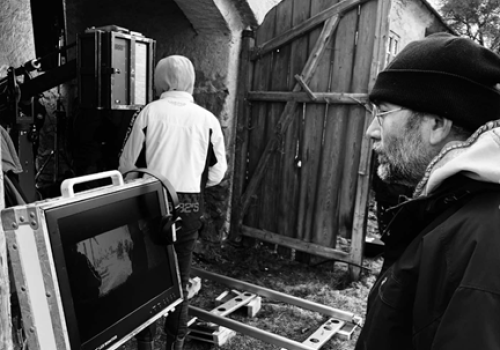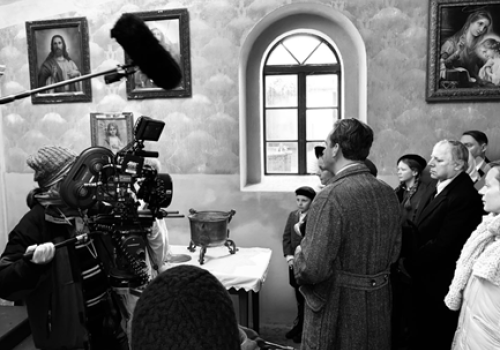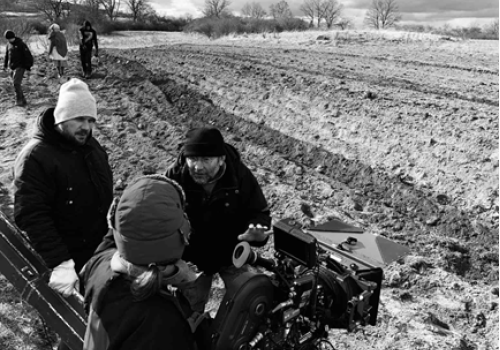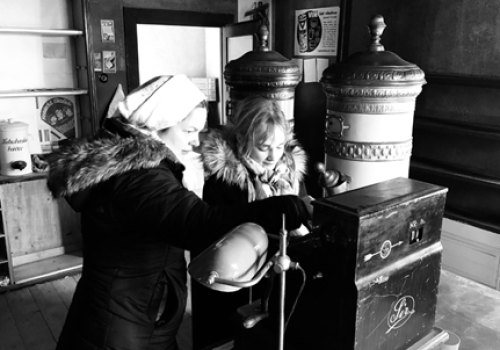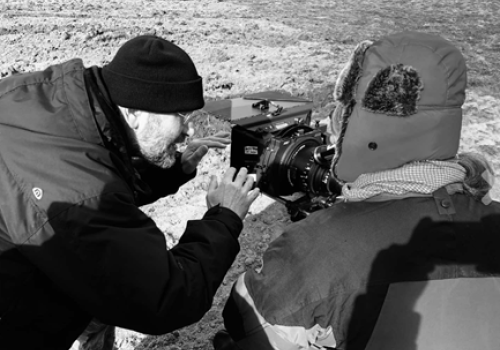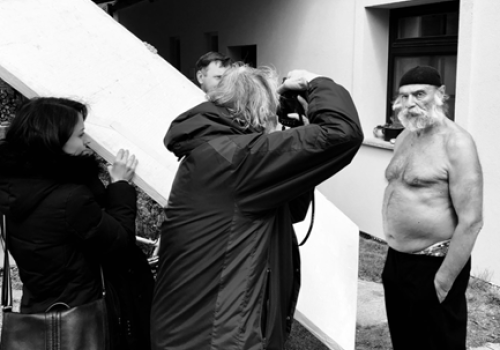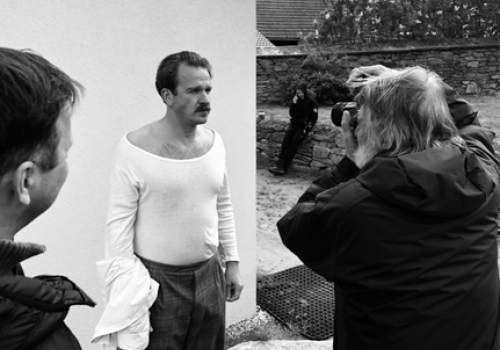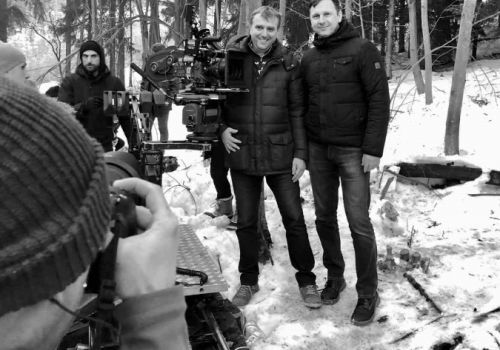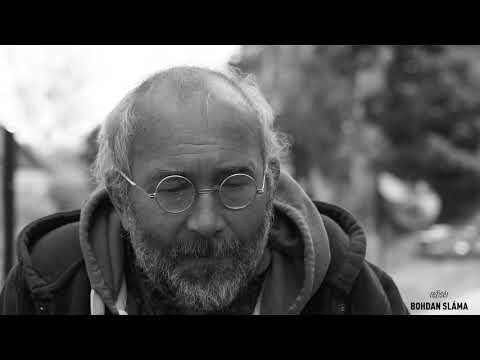Shadow Country
Shadow Country
Drama / Historical
Czech Republic, 2020, 135 min
Shadow Country by Bohdan Sláma is a chronicle of people and one small village in the border region, dragged through the history of the 1930s, 1940s and 1950s. The film's heroes face both Nazism and Communism, each coping with their promises and horrors in different ways. At the forefront of the story, then, is the fate of one family on whom the pre-war era, the war and the events after the war always hit with full force. Life in the village has always been communal, and in the difficult border conditions it was important for everyone to plant, harvest, survive the winter and raise their children.
But then there comes a time when it is necessary to choose who is Austrian, who is German and who is Czech. Suddenly one has to choose who among lifelong neighbors is an ally and who is actually an enemy. History has intervened in people's everyday lives and with it injustice, human weakness and violence. Neighbours can become murderers in such a moment. Marie is Czech, but her husband is firmly connected to the local soil and has always been German. They have a cottage, fields, are raising a son and trying to live by what is right. First they watch the growing mutual hatred of the people in the village, only to have the anger fall on themselves. (Bontonfilm)
Main staff
Bohdan SLÁMA
film director
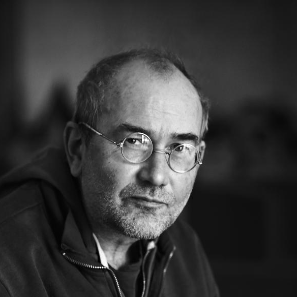
"When I read the script, the first half struck me as a well-written but expected description of familiar things that were happening at the time. I was a little crazy. I was touched by the fate of the Jewish family, for example, but these were situations that I had experienced in my soul as part of other stories. But then, when they actually put these people in the basement... When I read those scenes, I still believed it couldn't happen. I mean, they're neighbors. And then all of a sudden it's there and you're just staring. Then when the motif of the second expulsion was added to it, that is, the eviction of the affected family from their home long after the war, I understood the power of the story and its dramatic potential."
Bohdan Sláma (1967) graduated from the Czech Technical University and in 1997 he finished his studies at the Department of Directing at FAMU in Prague with his graduation film Acacia White (1996). In his feature debut Wild Bees (2001) he continued the poetics of the Czech New Wave of the 1960s and won awards at many international film festivals (including the Rotterdam IFF - Tiger Grand Prix, San Francisco IFF - SKYY Award).
He was nominated for an Oscar and a European Film Award for the Czech Republic. The similarly themed film Happiness (2005) won seven Czech Lions and won the San Sebastian Film Festival. Other successful titles were The Rural Teacher (2008), which won two Czech Lions, and Four Suns (2012), with which Sláma competed at Sundance. He has also made several episodes of the series Kancelář Blaník. He is the head of the directing department at FAMU.
Czech Lion
2005 - victory - Happiness - Best Director, Best Screenplay
2008 - victory - Country Teacher - Best Screenplay
2008 - nomination - Country Teacher - Best Director
2012 - nomination - Four Suns - Best Director, Best Screenplay
2017 - victory - Ice Mother - Best Screenplay, Best Director
2020 - nomination - Shadow Country - Best Director
Czech Film Critics Awards
2012 - victory - Four Suns - Best Screenplay
2017 - victory - Ice Mother - Best Screenplay
Ivan ARSENJEV
screenwriter
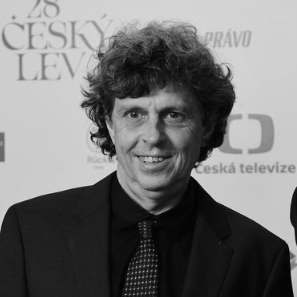
"Something like this can happen anywhere and anytime, it's naive to think it doesn't affect us. At the same time, for me, the Tutsi story, pre-war, war and post-war, is a kind of 20th century punishment. People had to decide, and still have to decide again, how to behave in what situation. The line between calm and unease is very narrow."
Ivan Arsenev (1961) after studying at the Prague Conservatory - organ - graduated from the Department of Screenwriting and Dramaturgy at FAMU in Prague, where he worked as an assistant professor for seven years. For several years he was a member of the Miloš Havel Foundation's committee for the support of screenwriting. He is the author or co-author of the screenplays for a number of feature films, e.g. Vojtěch, řečený orphan(1990 Z. Tyc), Záhada hlavolamu (1993 P. Kotek), Cesta pustým lesem (1997 I. Vojnár, Czech Lion for artistic achievement 1997, Main Prize - Noordelijk, New Evropean talent, Best Camera Barcelona), Peace to their souls (2004 P. Štingl, Honorary mention FITES)... For the short story The Guardian Angel he won the 2nd prize in the competition for the 100th anniversary of Czech film (1996).
Together with director and designer Jan Balej they created, among others, the puppet film One Night in a City (2007 Czech Lion, Critics' Award Kristián, Best Feature Film - Anifest Třeboň, Grand prix Monsters/RTP Lisbon, Special Jury Prize Animadrid Madrid, Golden Reel for Best Animated Film Tiburon USA, Special Jury Prize - Bilbao Animation Festival, Golden Crystal Globe for Best Animated Feature Film - Tehran, Grand Athena - Athens Festival and awards at the festivals in Sao Paolo, Hiorşima, Melbourne, Tehran, London and Bucharest). Other collaborative works with Jan Balej include the thirteen episodes of the TV evening series Karlik, the Goldfish (2010) and the script of the feature-length puppet film Malá z rybárny (2015).
In addition to screenwriting, Ivan Arsenev has worked as a dramaturge on a number of award-winning feature films and documentaries, such as Meringues, Indian and Nurse, Foxes, The Year of Cannabis, My Dog Killer (Hivo Tiger Award - Rotterdam 2013, Sun in the Net for Best Slovak Film of 2013, Main Prize Pilsen, Vilnius Directing Award, Andrei Tarkovsky Award, etc.)
Dramaturgically, he has worked within the framework of the theatre festivals Waves, held at the Theatre Ship Mystery, which he co-founded. As a scriptwriter, he has also collaborated on ANPU Theatre's productions of The Wedding Shirt (1998) and The Bell Jar from Mother of God (2005). As a director and dramaturg, he is involved in the Voices edition of author readings, which since 2014 has been releasing CD recordings of prominent Czech prose writers, poets and translators reading from their work.
Czech Lion
2020 - victory - Shadow Country - Best Screenplay
Czech Film Critics Awards
2020 - nomination - Shadow Country - Best Screenplay
Diviš Marek
camera

Diviš Marek (1964) is one of our most renowned cinematographers. Until 1989 Diviš studied at the MFF UK in Prague, but in 1990 he transferred to FAMU. He graduated in 1997 with Acacia White, directed by Bohdan Sláma. It was probably here that a bond between the two filmmakers was born, which later led to Diviš becoming Sláma's "court" cameraman.
Awards, Best Camera
Czech Lion
2005 - Happiness - victory
2007 - It's Gonna Get Worse - nomination
2012 - Four Suns - nomination
2017 - Ice Mother - nomination
2018 - Hastrman - victory
2020 - Shadow Country - nomination
Czech Film Critics Awards
2012 - Four Suns - nomination
2020 - Shadow Country - nomination
Jakub Kudláč
sound department
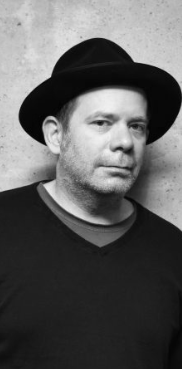
In the field of film sound, the most noteworthy is the feature film The Blue Tiger. However, his sound also appears in several animated films such as Seance or Perak: Shadow over Prague. He is also involved in stage theatre sound.
Awards, Best Sound
Czech Lion
2018 - Golden Stunt - nomination
2020 - Shadow Country - victory
Zuzana Bambušek Krejzková
costume
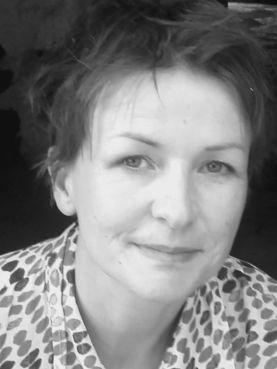
After graduating from SPŠT and the Higher Vocational School of Arts and Crafts/ Textile Restoration and Hand Textile Techniques, she worked as a costume designer on dozens of productions at the Na Zábradlí theatres, Drama Studio, Comedy Theatre, Vinohrady Theatre, Dejvice Theatre, V Dlouhé Theatre, NDM in Ostrava and since 2002 regularly at the National Theatre in Prague on drama and opera productions. Currently, she has also worked for Studio Hrdinů, for whose production of Kacířské eseje (Heretical Essays) she received the 2019 Divadelní noviny award for scenography.Since 1994 she has continuously collaborated with Bohdan Sláma on all his films.For J.Vejdělek she designed costumes for Roming and Václav.In Slovakia she collaborated with Jonáš Karásek on Amnestia/nomination for Slnko v sietti/ and Invalid. She was nominated for the Czech Lion Award for her costumes for 4 Suns, Hany and Baba of Ice and received the award in 2019 for her costumes for Landscape in the Shadows.
Awards, Best Costume
Czech Lion
2014 - Hany - nomination
2017 - Ice Mother - nomination
2020 - Shadow Country - victory
The Sun in the Net
2020 - Amnesty - nomination
Jan Daňhel
editing

Experienced editor, photographer and teacher at FAMU in Prague, where he teaches film editing. He collaborates with the most important Czech and Slovak directors.
Since 1992 he has worked as an editor on more than 40 feature films.
Awards, Best Editing
Czech Lion
2014 - The Hole at Hanušovice - nomination
2017 - Ice Mother - nomination
2017 - Quartet - nomination
2018 - Hastrman - nomination
2018 - Insect - nomination
2020 - Shadow Country - victory
Czech Film Critics Awards
2020 - Alchemical Furnace - nomination - Best Documentary
Media reviews
Josef Rauvolf, ČT24.cz:
"Bohdan Sláma's new feature film Landscape in the Shadows describes the harsh reality of a border village just before, during and after the war. It is one of the films that had to be made - and the fact that it not only opens old wounds, but sprinkles them with pepper and salt is only good. We all need it, pretty badly. Not to mention the fact that Shadow Country is a truly accomplished film that - if we don't want to dwell on the trivialities - really has nothing to fault."
Kamil Fila, Aktualne.cz:
" It's a film that keeps the emotion going longer, it lets you move between the sympathies between different people, it shows the complexity of human history. Nothing better than Shadow Country has been made here this year."
Jana Podskalská, Denik.cz
"Black and white suits the rawness of the story, and the whole visual concept is remarkable. The cinematographer Marek Diviš once again proved his sense of composition and mood. The musical aspect combines motifs of Czech folk, Jewish and German songs.
Despite reservations, this is a filmmaker's original and meritorious achievement. A gauntlet thrown down to all those who avoid the subject and live in the feeling that there is no reason to address anything. But maybe it's time to bring more light into our shadowed landscapes.
The cast
Character: Marie Veberová
He is an orphan and comes to the village of Schwarzwald from the city. She marries a peasant farmer, Karl Weber, twenty years her senior. Her character is cheerful and a little whimsical. For a woman from the village, she likes to dress up. She has her own sewing machine and even a gramophone. She likes to listen to modern music on it. She is quickly becoming popular in the village because of her immediate openness and willingness to help anyone. Mother Vebra's daughter-in-law doesn't go too far. He instructs her in German on what to do, but she doesn't understand, she only knows Czech. At the beginning of the war, Marie does not agree to have her husband transcribe her German nationality. Nevertheless, under pressure from her family, she complies. During the war she bears the German occupation hard. However, she undergoes a fundamental change after the brutal death of her husband Karl. The once cheerful, charming woman no longer wears black. She lives in one room in her house, the rest is occupied by the new owner who has taken the house. Their three cows have been stolen, and their curtains hang outside the windows in the house next door. Some neighbours return their stolen items (often secretly by putting them behind the door), others do not. The whole family must wear white armbands and are not allowed to walk on the sidewalk. Despite all this, Marie is the archetype of a woman who cannot be brought to her knees even by harrowing circumstances.
Magdalena Borová (1981) was born in Frýdlant, Bohemia, but grew up in Liberec. During her studies at grammar school she worked in the theatre group Stopa. After graduation she moved to Prague and started studying at DAMU. During her studies she was a guest in several theatres - for example in Studio Two or Drama Club. In 2004, she won the Alfréd Radok Award for acting in the Talent of the Year category. Since 2004 she has been a member of the National Theatre Drama Department. She has appeared in several television films, such as Hrubeš and Mareš are Friends in the Rain, I, Olga Hepnarová and Landscape in the Shadow.
Awards, best actress in a leading role
Czech Lion
2020 - Shadow Country - victory
Czech Film Critics Awards
2020 - Shadow Country - victory

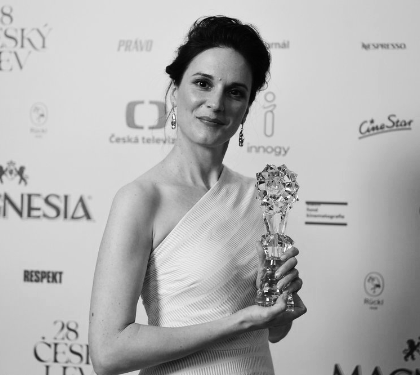
Character: Karel Veber
Karel Vébr is actually a rich man by local village standards. He is the only one who has a small tractor in the village. He married his wife Maria quite late, after he was fifty. More or less under pressure from her authoritarian mother. But she wasn't too happy with his choice of partner. However, the pretty young Marie, an orphan from a nearby town, charmed Charles. Perhaps because of her extrovertedness and assertiveness. Well, opposites attract. He himself is a thoughtful introvert, a rather solitary type. And so he is sometimes caught between two fires in the household: on one side stands the temperamental Marie and on the other the aging mother who is gradually losing her influence over her first-born son. Karel prefers his peace and therefore finds some situations very difficult to handle. And he runs away from things rather than determining their direction. But he loves his new wife more than he expected at the beginning. Nor does he take the circumstances of the occupation lightly. Although he considers himself more of a German, he certainly wants nothing to do with Reich politics. Although he has helped many people during the war, he cannot escape the fury of the self-appointed judges thanks to his wealth.
Stanislav Majer (1978) was born in Louny and trained as a carpenter. He performs at the Drama Studio in Ústí nad Labem and since September 2012 also at the Na zábradlí Theatre. In the past he was a member of the Comedy Theatre. He became known to a wider audience thanks to the series Ulice. He has also appeared in the series The Wonderland and The Miracles of Life. His first major film opportunity was given by director Jan Hřebejk in a film adaptation of the play Waste, City, Death. An important milestone in his acting career is undoubtedly the lead role alongside Anna Geislerová in the film drama Honeymoon. He also shone in Bohdan Sláma's film Landscape in the Shadows. Many critics predict a promising future for Majer as an actor.
Award, Best Performance by a Male Actor in a Supporting Role
Czech Lion
2020 - Shadow Country - nominations
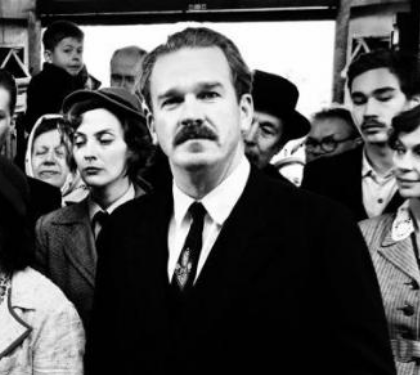

Character: Josef Pachl
Josef Pachl is a man in his prime. Although intelligent and well-read, he often doubts himself. He's certainly not a predatory fighter. Rather, he's an emotional and compassionate man. But when that builds up, he can explode and then act inappropriately harsh. He's been under the spell of Communist propaganda since he was young. He is an idealist who believes that only a classless society and common ownership of things will make order even in their village. He is the main organizer of the Friends of the Soviet Union in the region. Sometimes he wears round glasses that make him look like an intellectual. The great mystery is why he has the most beautiful woman in the area, the daughter of a Jewish merchant, Elen, as his wife. He often asks himself this question. However, this is the woman he loves most in the world. He writes her ardent love poems and even composed a short ballad for her. The fact that he loses his most beloved person during the war transforms his character to revenge. He sets in motion a wild chain of events which he bitterly regrets at the end.
Csongor Kassai (1972) was born in Kralovsky Chlmec. The name Csongor is of Hungarian-Turkish origin. He graduated from the secondary school of electro-industry, but immediately after graduation he joined the Thalia Theatre in Košice, where he got a permanent engagement. He graduated from the Academy of Performing Arts in Bratislava, majoring in acting. Since 1996, he has been a member of the Radošín Naive Theatre, and he has been a guest at the Drama Theatre of the Slovak National Theatre and the New Stage. He also performs in other theatres. He is probably best known for his role as the Jewish young man David Wiener in Jan Hřebejk's film We Must Help Each Other, for which he won the Literary Fund Prize. He also gave a great performance as Lucifer in Roman Vávra's fairy tale Čert ví proč (The Devil Knows Why), in which he even refused to be represented by a stuntman and filmed all the scenes himself. He can be found in a number of Czech-Slovak films, starting with Martin Šulík's Krajinka / Landscape, Juraj Nvota's Kruté Radosty / Cruel Joys, Slunečné Státem / The Sunshine State and, most recently, Krajina ve stínu / Landscape in the Shadows. When asked what film role he would like to play, he says Forrest Gump.
Awards, Best Male Actor
Czech Lion
2020 - Shadow Country, Leading Role - nomination
Slnko v sieti
2017 - Teacher, Supporting Role - nomination


Character: Anna Svitková
Anna Svitková is a resolute woman. She owns a pub in the village, she is enterprising. She directs and influences events, including the life of her brother, Karel Vebro, who is indecisive and listens to his sister in almost everything (often to the disapproval of his wife, Marie). When the villagers have to decide between Czech and German citizenship because of the census, Anna makes a rational, pragmatic decision and encourages her brother Karel to do the same. After all, there are advantages - she runs the pub and is a single mother and her brother owns the farm. She is even proud when her only son goes to the front to fight for the ideas of the Reich. But everything changes suddenly when Anna receives news that her son has been killed in action. In an instant, her idea of a well-ordered life is shattered. She is unhappy, despairing, suffering the loss of her beloved son. Eventually, in the tense moments of the war's end, she is tried by a people's court and then killed, mainly because of her affiliation. Her property is dismantled by her neighbours.
Petra Špalková (1975) was born in Brno and from the age of ten she performed in productions of the Brno Theatre on a String. Her other engagements include the Prague Drama Club, Theatre Na zábradlí and the National Theatre in Prague. In 1997, she won the Thalia Award for a young drama actor under 33 years of age. She has appeared regularly in films since the 1990s, first in the musical The Summer of the Jackals, then in the film Kolya and the tragicomedy Babí léto. In 2002, she was nominated for the Czech Lion Award for the film Strangers, and in 2013 she won the Czech Lion and the Czech Film Critics Award for her starring role in the psychological drama Jako nikdy. In Pustina she plays the character of Vice-Mayor Masařová.
Awards, Best Actress
Czech Lion
2020 - Shadow Country, Supporting Role - Victory
2017 - Ice Mother, Supporting Role - victory
2013 - As Never, Lead Role - victory
2002 - Strangers, Leading Role - nomination
Czech Film Critics Awards
2013 - As Never, Leading Role - victory
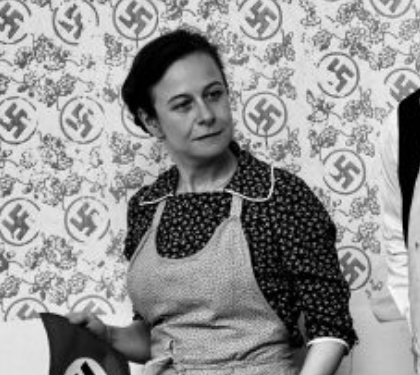
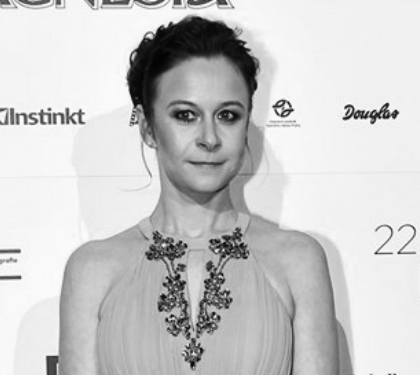

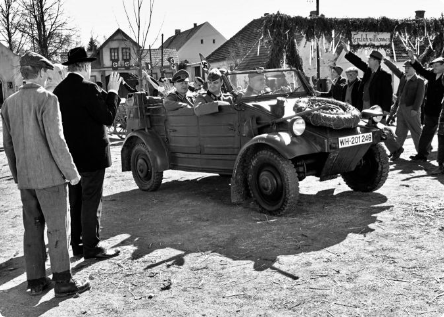
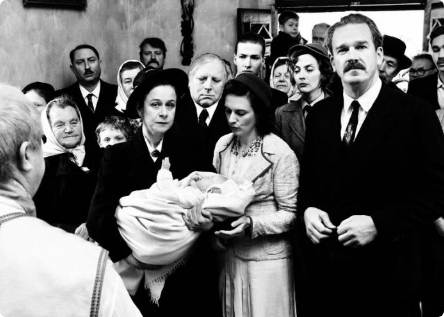
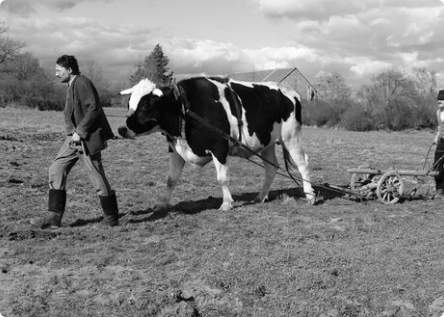

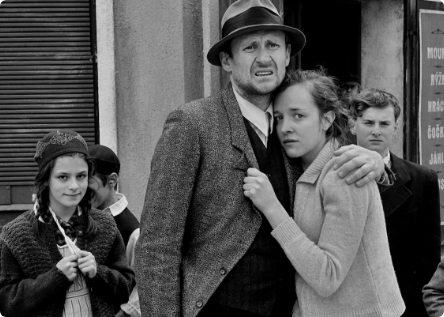
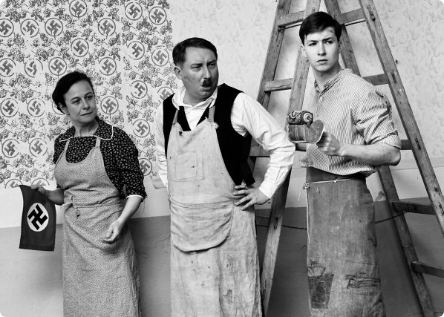

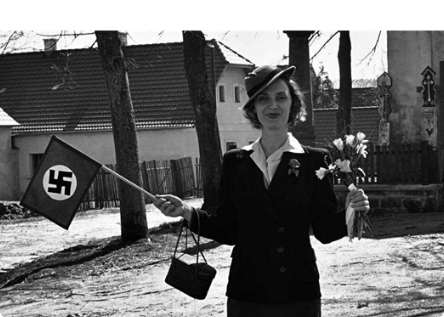
Awards
Czech Lion - awards and nominations
2020 | Best Feature Film | Jindřich Motýl, Martin Růžička - NOMINATION
2020 | Best Director | Bohdan Sláma - NOMINATION
2020 | Best Actress in a Leading Role | Magdaléna Borová - THE HOLDER OF THE CZECH LION
2020 | Best Actor in a Leading Role | Csongor Kassai - NOMINATION
2020 | Best Supporting Actress | Barbora Poláková - NOMINATION
2020 | Best Supporting Actress | Petra Spalkova - CZECH LION HOLDER
2020 | Best Supporting Actor | Stanislav Majer - NOMINATION
2020 | Best Screenplay | Ivan Arsenev - CZECH LION HOLDER
2020 | Best Cinematography | Diviš Marek - NOMINATION
2020 | Best Editing | Jan Daňhel - CZECH LION HOLDER
2020 | Best Sound | Marek Poledna - NOMINATION
2020 | Best Sound | Jakub Kudláč - CZECH LION DIRECTOR
2020 | Best Set Design | Jan Novotný - NOMINATION
2020 | Best costumes | Zuzana Bambušek Krejzková - CZECH LION DIRECTOR
2020 | Best masks | Lukáš Král - NOMINATION
2020 | Best Film Poster | Jan Poukar - ČFTA AWARD HOLDER
Czech Film Critics Awards 2020
Best Film
Shadow Country
Best Actress
Magdalena Borova (Shadow Country)
Interview with the director and screenwriter
Bohdan SLÁMA
movie director
For director Bohdan Sláma, it was almost a counter-task. And at the same time, a theme that took strange detours towards him. The screenplay was written by Ivan Arsenjev, based on the idea of producer Martin Růžička, and was originally to be shot by Zdeněk Jiráský. The filmmakers found a village not far from Slám's home. Then there was a disagreement between the producer and the director and the script was left in tatters. Bohdan Sláma was around and liked it.
You prefer to write your own scripts. What attracted you to it?
The situation that neighbors can do such terrible things to each other. And to get to the bottom of why it's happening. The image of a community that is under pressure. The definition of heroism in the midst of all this marasmus. of a small man standing up in the midst of the history that's rolling over him. We have to ask ourselves how we would behave in similar situations. The script was originally written for a much bigger budget and more settings. We've concentrated it so that the action takes place in one place.
Did it bother you that you were working with such a limit from the beginning?
No. I think the concentration and the stylization that comes from that limitation benefited the story.
It takes almost an hour for the viewer to get to know the characters. Were you aware of that?
We dealt with it fundamentally. Even I felt after reading the script that it took a long time. And it's only after a long time that something starts to happen. So we tried to make the first part as short as possible. But it was also necessary to give the viewer space to get to know the characters and their characters.
The film covers the period from 1938 to 1952. A daunting task. An unusual one for you, moreover.
Yes, the epic principle isn't exactly comfortable for a film. A closed drama developed over a short period of time is better and easier, I prefer it. But the concept of Landscape in the Shadows was like that, we couldn't skip all the years. Otherwise the viewer wouldn't know why the characters behave in a certain way later on. We worked a lot with costumes and sets that change over time.
How did the actors manage to bridge such a large time span?
We started rehearsing a year in advance. The most difficult scenes first. To see how the actors work. There's a group of characters at the centre who were dependent on each other and we needed to make each of them understandable enough. And that they knew exactly what their role was and worked as a unit. I listened to them, the actor is a partner for me, not a puppet.
The imagery is haunting. Was it a joy to return to 35mm film?
Yes, great. It was the first time we'd shot on black and white material in a long time. We shot all the rehearsals to keep the actors concentrated, and then there was a single shot in sharp focus. I find it reprehensible that the film has already moved away from that format completely.
Your film is not an easy spectacle. Apart from the scenes of expulsion and the so-called People's Court, it gives a cruel testimony to the Czech character. What kind of audience reactions are you expecting?
I make films for viewers who are willing to think and can look at things with a detached perspective. I think they will have no problem understanding and accepting the film. This has already been shown at the previews. Our film is not for the audience that goes to the cinema to have fun and eat popcorn.
Where would you place Landscape in the Shadows in your career of mostly social dramas?
I've been involved with Švejk and the First World War for a long time, so I was paradoxically mentally prepared for this project - although unplanned. Much of what the story touches on, including that Czech narrative, was already sealed in the first war. And it was, of course, a directorial challenge for me to shoot someone else's script.
Landscape in the Shadows opens up a topic that Czechs are still not very willing to talk about: expulsion. The Germans dealt with it on screen much earlier, in the 80s and 90s. Why does it take us so long?
Because there is a long-held myth of mystical national innocence. How we are victims of all kinds of circumstances and others. What happened was someone else's fault, not ours. But I think now that people have realized in the last six months with the pandemic how fragile the existence of conveniences like freedom and respect for the other is, they will find the strength to see things differently. And to revisit even those stories of the past when we have hurt others. It's a matter of cultural and moral maturation.
Ivan ARSENJEV
screenwriter
They said about the film
Tomáš Halík, theologian and philosopher:
"Evil is still within us, if those who show their power through comments on social media were to get their hands on a gun, they would do terrible acts even now...."
Daniela Drtinová, DVTV journalist:
"under the guise of human rights, the same beasts rage within us...."
Mikuláš Kroupa, Memory of the Nation, Post Bellum:
"the expulsion in May 1945 caused such terrible crimes that this society cannot cope with...."

